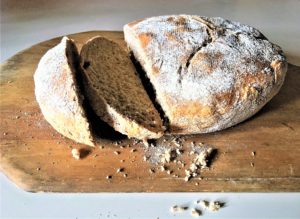 I’m a darn good bread baker, but my early works could have passed for geologic specimens. Not soft sandstones or limestones either. These were metamorphics, loaves of the Grand Canyon’s Precambrian, nourishment that could break your teeth. The problem was I didn’t believe in the delicate properties of yeast, or its shelf life—or recipes, for that matter. I read somewhere that way back when, the Egyptians made bread in large wet batches, using shovels to mix the dough. I imagined trenches of bubbly, yeasty goo, and armies of men in abbreviated clothing leaving off building the pyramids to go tend to the bread dough. How difficult could it be?
I’m a darn good bread baker, but my early works could have passed for geologic specimens. Not soft sandstones or limestones either. These were metamorphics, loaves of the Grand Canyon’s Precambrian, nourishment that could break your teeth. The problem was I didn’t believe in the delicate properties of yeast, or its shelf life—or recipes, for that matter. I read somewhere that way back when, the Egyptians made bread in large wet batches, using shovels to mix the dough. I imagined trenches of bubbly, yeasty goo, and armies of men in abbreviated clothing leaving off building the pyramids to go tend to the bread dough. How difficult could it be?
For reasons unknown, most of my lessons in humility have taken place in the state of Vermont. Learning to ski was an exercise in frostbite and frustration. As for fly fishing, did God invent trees and breezes just to catch and tangle my line? The Great Winooski River Raft Race was another reminder of my own puniness in the face of Mother Nature’s spring runoff. The rules were deceptively simple: participants created their own modes of transport, and on these contraptions we were to navigate roughly eight miles of the Winooski River in full flood. Navigate we didn’t. Our raft was made of plywood, two-by-fours and, for flotation, an optimistic number of empty plastic milk jugs. It was square-ish and no amount of paddling by the eight of us aboard could change its course. At the first bridge, half-a-mile downstream, our ship hit the center piling and dumped us all in the river. Most of us were wearing full raingear, which made it difficult to swim. I still don’t know how we climbed out of there alive. Perhaps the river bank took pity and approached us instead.
So it’s no surprise that my initial dressing-down by Demeter, the Greek goddess of grain and bread, occurred when I was living in Vermont. It was summer. The word green had taken on a new dimension. I had a job mowing lawns and tending gardens, working for a man known to everyone as Tubby. I called him Mr. Hodgdon. I was a young 18, living on spaghetti, and for some reason my 10-year-old brother was sent to visit me, poor kid. I picked him up at the bus station in Rutland and after a few words (“How was your trip?”) our conversation stalled and didn’t come to life again until several days later, the day I decided to become a baker of bread.
If you pour scalding water over a package of very old yeast you happen to find at the back of a shelf in a house in Vermont, mix in some sugar, flour and too much salt, and set it down in the chilly cellar because you dimly recall that yeast needs either warmth or cold to rise but you can’t remember which. You may only count on a miracle to produce something that resembles bread. Too much salt will dumb down the rising, and hot water will kill the already-geriatric yeast. Without the right amount of warmth and youth the project has no backbone. Add impatience to the mix, and Demeter herself will present you with an unrisen lump of glutenous disappointment.
That memorable day, I waited an hour for the miracle to occur and when it did not, I waited another hour. When the dough still showed no signs of life, no doubling in size, no puffiness whatsoever, I decided to let it rise overnight. The next day, in the chilly darkness of the cellar, still no change had occurred and I decided my expectations were the problem. I carried the dough up to the kitchen, dropped the lump on a baking sheet and placed it in the oven. When it turned brown I took it out of the oven and told my brother there was fresh bread for dinner. He was not convinced.
Of course there is no perfect loaf, only different expressions of imperfect ones. But as imperfection goes, that Vermont creation of mine hit some sort of zenith. It resisted my attempt to cut it with a knife, and my resourceful brother went and got a bow saw from the cellar. That was unwieldy, which started us laughing and talking again after our days of verbal drought. We were curious enough to bring The Stone, as we affectionately called it, outside to the woodpile where with one strike of the axe the hard little thing broke open, revealing a rawness, an inedible tenderness at the center that made us suddenly solemn. It must have reminded us of ourselves.
My brother took after our mother and became a magnificent cook, but a baker he is not. He pays me the greatest compliment when he asks for my three-hour bread recipe, or the one with the 18-hour rise. He’ll try it and report that the crust was too soggy or the inside too chewy. He wonders what he’s doing wrong. Did he measure incorrectly? Was the oven too cool? It’s hard to explain to him that bread doesn’t respond well to expectations. It likes you to have an enjoyable time making it, then please step back and let it make itself. It’s more alchemy than science. More intuition than knowledge. More poetry than manifesto. Bread has changed very little over the years, though it’s created anew every day in every country on this planet. It’s our connection to the past and a common language in the present. If you would like to learn that language, here’s a recipe with a shaggy wet dough to remind you of the ancient Egyptians. You may wish to mix it with a shovel, though I often use a spoon:
Mix together 3 cups flour, 1¼ teaspoons salt, ¼ teaspoon plus a pinch more yeast, 1⅝ cups water. Let sit in a warm place (not in your cellar!) for 18 hours. Using extra flour, form into a smooth ball. Let rise two hours. Preheat oven to 450 degrees and place a Dutch oven in to heat up for at least half an hour. When the dough has finished rising, take the DO out of the oven, plop the dough in, put the lid back on and place it back in the oven. After 15 minutes, reduce the heat to 425. After another 15 minutes take the lid off and continue baking for another 11 to 15 minutes or until nicely browned on top and smelling the way good bread does.

